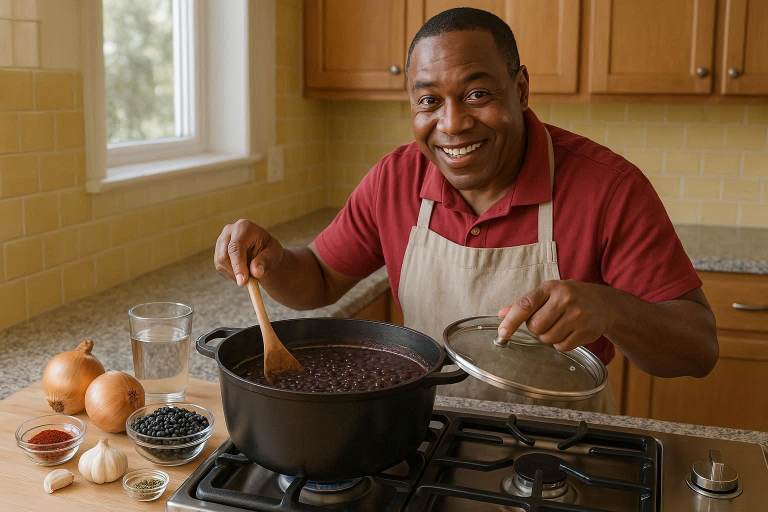Black beans are a pantry staple in many homes worldwide, known for their versatility, rich flavor, and nutritional benefits. These small but mighty legumes are packed with protein, fiber, and antioxidants, making them an excellent addition to a variety of dishes. Whether you’re making soups, salads, or even veggie burgers, black beans are a go-to ingredient that can take any meal to the next level.
In this guide, we’ll show you how to cook black beans easily and effectively while maintaining their flavor and nutritional value. No matter what method you prefer—stovetop, Instant Pot, slow cooker, or microwave—you’ll learn the tips and tricks for perfect black beans every time.
How should black beans be cooked?
Cooking black beans is easy and requires just a few steps to achieve tender, flavorful beans. The first step is soaking the beans. Rinse them thoroughly to remove any debris, then soak them in a large pot of water. Soaking helps reduce cooking time and makes the beans easier to digest. You can soak black beans for about 6-8 hours, or overnight for best results. If you’re in a hurry, you can use the quick-soak method: bring the beans and water to a boil, then let them sit for an hour before draining.
After soaking, drain the beans and place them in a large pot. Add fresh water—about 3 cups of water for every cup of soaked beans. Bring the water to a boil, then reduce the heat and simmer the beans for 60-90 minutes until they are tender. Check occasionally and add more water if needed.
Once cooked, drain any excess water and season the beans to your taste. You can add ingredients like garlic, onion, bay leaves, or a pinch of salt during cooking to enhance the flavor.
Is it okay to cook black beans without soaking?
Why Cook Black Beans at Home?
Health Benefits of Black Beans
Black beans are not just a tasty addition to your meals; they’re also packed with health benefits. Here are some of the key reasons to make black beans a part of your diet:
- Rich in Plant-Based Protein: Black beans are an excellent source of plant-based protein, making them ideal for vegetarians, vegans, or anyone looking to reduce their meat consumption.
- High in Fiber: With over 15 grams of fiber per cup, black beans support digestive health, help regulate blood sugar levels, and promote feelings of fullness, making them perfect for weight management.
- Antioxidant-Rich: Black beans are rich in antioxidants, which help fight inflammation and protect your body from oxidative stress.
- Heart Health: Regular consumption of black beans can contribute to heart health by reducing cholesterol levels and supporting healthy blood pressure.
Cost-Effectiveness and Versatility
- Affordable: Compared to canned beans and other protein sources like meat, black beans are budget-friendly and widely available, making them a great choice for anyone looking to eat healthy on a budget.
- Versatile Ingredient: From savory dishes like soups and tacos to fresh salads and even veggie burgers, black beans can be used in a wide variety of dishes. They pair well with grains, vegetables, and proteins, making them the perfect addition to many cuisines.
Avoiding Added Preservatives and Sodium
Cooking black beans at home allows you to control the ingredients and avoid Guide to Mastering Everyday Cooking excess sodium and preservatives found in canned versions. Plus, homemade beans taste fresher and have a better texture than their canned counterparts.
Preparing Black Beans for Cooking
Before you cook your black beans, there are a couple of essential steps to ensure they turn out perfectly.
Sorting and Rinsing the Beans
- Sort Through the Beans: Sometimes dried beans can contain small pebbles or debris. Sorting through them helps you ensure that only clean, good-quality beans make it to the pot.
- Rinse the Beans: Rinsing is important to remove any dust, dirt, or excess starch, which could make your beans sticky or mushy. Place the beans in a fine-mesh strainer, rinse under cold water, and stir gently.
Soaking Black Beans (Optional but Recommended)
While soaking black beans isn’t strictly necessary, it can significantly reduce cooking time and help improve the texture. Soaking also helps to break down compounds that can cause digestive discomfort.
Soaking Methods:
- Overnight Soaking: Soak your black beans in plenty of water for 6-8 hours or overnight. Drain and rinse before cooking.
- Quick Soak Method: If you’re short on time, bring the beans and water to a boil, let them boil for 2-3 minutes, then cover and remove from heat. Let the beans sit for 1 hour before draining and cooking.
Different Methods to Cook Black Beans
There are several methods you can use to cook black beans, depending on your preferences and available equipment. Let’s dive into the details of each method.
Stovetop Method (Traditional Cooking)
Cooking black beans on the stovetop is the traditional method that allows you to control the cooking process.
Step-by-Step Instructions:
- Rice-to-Water Ratio: For every cup of dried black beans, use about 3 cups of water.
- Cooking: Bring the water to a boil, then reduce the heat to low. Cover the pot and let the beans simmer for 1 to 1.5 hours (depending on whether or not they’ve been soaked).
- Seasoning: Add salt, garlic, onion, or bay leaves for extra flavor during cooking. Just remember, add salt at the end to avoid toughening the beans.
- Fluffing: Once the beans are tender, let them sit for a few minutes before serving.
Instant Pot Method (Quick & Convenient)
The Instant Pot makes cooking black beans quicker and easier. It’s perfect for busy individuals who want to save time without sacrificing flavor.
Step-by-Step Instructions:
- Rice-to-Water Ratio: For soaked beans, use 1 cup of beans to 1.25 cups of water. For unsoaked beans, use a 1:1.5 ratio.
- Cooking: Add the soaked beans and water to the Instant Pot. Set it to high pressure for 25-30 minutes. If using unsoaked beans, cook for 35 minutes.
- Natural Release: Allow the Instant Pot to release pressure naturally for about 10 minutes, then fluff the beans with a fork.
Slow Cooker Method (Set It and Forget It)
The slow cooker is perfect for those who want to set it and forget it. While it takes longer, it’s a hands-off method that allows you to cook beans while you do other tasks.
Step-by-Step Instructions:
- Rice-to-Water Ratio: Use 4 cups of water for every 1 cup of dried black beans.
- Cooking: Place beans and water in the slow cooker. Set it to low and cook for 6-8 hours, or on high for 3-4 hours.
- Fluffing: Once the beans are tender, give them a quick stir to fluff and serve.
Microwave Method (For Small Batches)
Need a quick fix for black beans? The microwave method is great for small batches of soaked beans.
Step-by-Step Instructions:
- Rice-to-Water Ratio: Use 1 cup of beans to 1.5 cups of water.
- Cooking: Combine the soaked beans and water in a microwave-safe bowl. Cover loosely with a microwave-safe lid and cook on high for 8-10 minutes, stirring halfway through.
- Fluffing: After cooking, let the beans sit for 5 minutes before fluffing them with a fork.
How to Season Black Beans for Maximum Flavor
Black beans are naturally delicious, but a little seasoning can elevate them to the next level. Here’s how to bring out their full potential.
Basic Seasonings for Black Beans
The essential seasonings for black beans include salt, pepper, and garlic. These basics form the foundation for any black bean dish.
Adding Flavorful Ingredients
- Bay Leaves: Add a couple of bay leaves during cooking for a herbal, aromatic flavor.
- Cumin and Chili Powder: These spices bring warmth and depth to black beans, perfect for Mexican and Southwestern dishes.
- Onions and Garlic: Sauté them before adding the beans to create a richer base of flavor.
- Fresh Cilantro: Add chopped cilantro after cooking for a fresh, vibrant finish.
Customizing Black Beans to Suit Different Cuisines
- Mexican Flavors: Add lime juice, cumin, chili powder, and cilantro for a zesty, spicy flavor profile.
- Caribbean Twist: Add coconut milk, ginger, and a bit of allspice for a tropical, savory dish.
- South American: Incorporate garlic, onion, and a splash of vinegar for a tangy, hearty bean base.
How to Use Cooked Black Beans in Delicious Dishes
Once your black beans are cooked, they can be used in a variety of dishes. Here are a few ideas:
Black Bean Soup
This hearty, nutritious soup is made by simmering black beans with tomatoes, onions, garlic, and vegetable broth. Add some cumin and chili powder for extra flavor.
Black Bean Tacos or Burritos
Cooked black beans make a delicious filling for tacos or burritos. Top with fresh guacamole, salsa, cheese, and a squeeze of lime for a satisfying meal.
Black Bean Salad
Combine cooked black beans with corn, diced tomatoes, onions, and a simple vinaigrette for a light and refreshing salad.
Black Bean Burger Patties
Mash cooked black beans with breadcrumbs, spices, and egg to form veggie burger patties. Fry them in a pan for a crispy, flavorful meal.
Black Bean Chili
Add black beans to your favorite chili recipe for a protein-packed, hearty dish. Customize with other beans, vegetables, and spices.
Storing and Reheating Cooked Black Beans
How to Store Cooked Black Beans
Store cooked beans in an airtight container in the fridge for up to 4 days. You can also freeze them for up to 6 months, ensuring you always have cooked beans ready to go.
Reheating Black Beans
Reheat cooked beans on the stovetop, in the microwave, or in the oven. Add a bit of water or broth to keep the beans from drying out.
Troubleshooting Common Issues When Cooking Black Beans
Beans Too Hard
If your beans are still hard, they likely needed more water or cooking time. Add extra water and cook them a bit longer.
Beans Too Soft or Mushy
Mushy beans are often caused by overcooking or too much water. Reduce the cooking time next time or strain excess water.
Bitter-Tasting Beans
Bitter beans may be the result of over-soaking or insufficient rinsing. Always rinse your beans thoroughly before cooking and avoid soaking for too long.
FAQs
How do I cook black beans from dry without soaking them?
You can cook dry black beans directly on the stovetop or in a pressure cooker, but it will take longer (around 2-3 hours on the stovetop).
Can I cook black beans without soaking them first?
Yes, though soaking reduces cooking time and helps with digestion. If you skip soaking, cook the beans longer and use more water.
How long should black beans cook in an Instant Pot?
For soaked beans, cook on high pressure for 25 minutes, and for unsoaked beans, cook for about 35 minutes.
What’s the best way to season black beans?
Basic seasonings like garlic, cumin, and salt work well, but you can also customize with chili powder, bay leaves, or fresh herbs like cilantro.
How can I cook black beans in the microwave?
Microwave soaked black beans with water in a microwave-safe bowl for about 8-10 minutes, stirring halfway through.
Conclusion
Cooking black beans at home is simple, nutritious, and incredibly versatile. By following these methods and seasoning tips, you can enjoy perfect black beans in any dish, from soups and salads to tacos and veggie burgers. Don’t hesitate to experiment with different flavors and cuisines to make the most of this affordable, healthy ingredient. Happy cooking!

